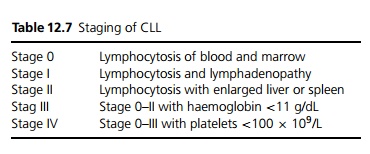Chapter: Medicine and surgery: Haematology and clinical Immunology
Chronic lymphocytic leukaemia - Chronic leukaemia
Chronic leukaemia
Chronic lymphocytic leukaemia
Definition
Chronic lymphocytic leukaemia (CLL) is a leukaemic proliferation of mature B lymphocytes.
Incidence
1.8–3 per 100,000 per year
Age
Peak diagnosis 60–70 years
Sex
M > F
Pathophysiology
Although there is a proliferation in B cells they have abnormal function resulting in hypogammaglobulinaemia. Staging is shown in Table 12.7.

Clinical features
Patients may be asymptomatic. Symptoms result from marrow failure (anaemia, infection and bleeding). On examination there may be lymphadenopathy and hepatosplenomegaly.
Investigations
Full blood count reveals a low or normal haemoglobin, a white cell count >15 × 109/litre of which at least 40% are lymphocytes, platelets are low or normal. Autoimmune haemolytic anaemia/ thrombocytopenia are present in 10%.
Blood film demonstrates a high lymphocyte count and because these are fragile they appear as smear or basket cells.
Hypogammaglobulinaemia may be present.
Management
CLL frequently requires no treatment other than supportive measures. Symptomatic disease may be treated with intermittent chemotherapy such as chlorambucil or fludarabine.
Prognosis
Prognosis is related to clinical staging.
Related Topics